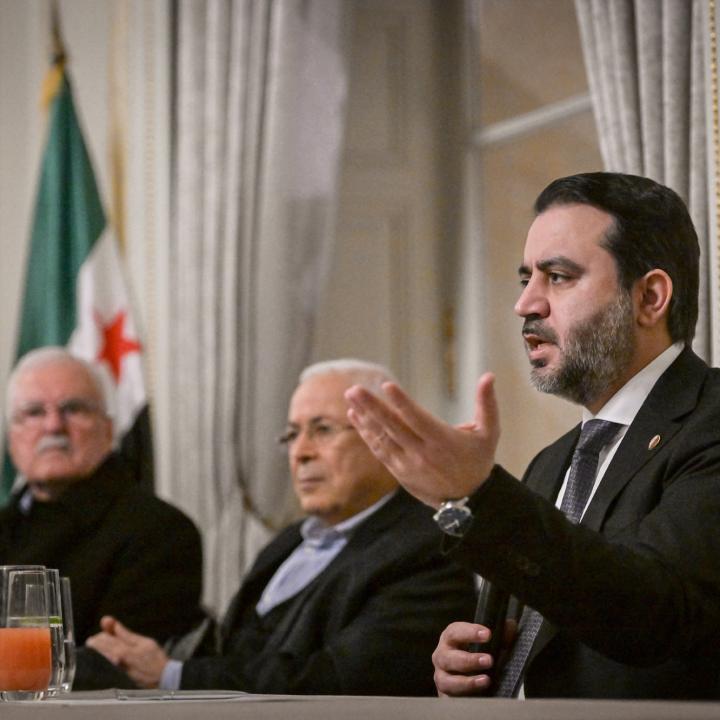

The new Syrian government will be judged not just by its treatment of minorities, but also how it approaches political opposition—and its checkered history in this regard gives pause.
Months after HTS and its allied groups swept through Assad-held territories of Syria, the question of Syria’s post-Assad governance looms large for many Syrians, especially given last month’s massacres in Jableh. The steps that have been taken so far—including a hastily convened national dialogue conference and a temporary constitution establishing a five year transitional phase—still lack details about what the new Syria will encompass.
There is a recognition that rebuilding Syria will take time and resources, requiring mine clearance, basic infrastructure repair, and the restoration of essential services like water and electricity. While many Syrians are willing to accept the destroyed or degraded current state of the country for the time being in order to return to their homes, Syrians must also navigate the divide between pragmatism and deeply rooted distrust in a centralized authority, especially given HTS’s checkered history with minorities and its approach to Syrian opposition activists during its control of Idlib.
The transitional government’s signaling of moderation has occurred over a series of years and is designed for a domestic audience as well as an international one; HTS has publicly shifted its sources of jurisprudence from Wahhabism and Hanbali extremism to the more moderate Shafi'i school. They may also take future steps, such as implementing the "Unified Arab Law" for legal and judicial matters, a framework issued by the Arab League through its justice ministers and specialized committees—as was adopted by Ahrar al-Sham in 2017 as a similar means of signaling moderation.
However, the new leadership’s efforts to form a transitional government have been scrutinized for their inclusion—or lack thereof—of minority voices. Likewise, messaging directed towards Syria’s minorities has been met with public skepticism and satire—Ahmed al-Sharaa has been mocked as the “New Protector of Minorities”—in reference to Bashar al-Assad’s self-proclaimed title. Meanwhile, the new government’s campaigns and media coverage that have tried to reassure Syria’s minority communities, including Aleppo’s Christian public—featuring interviews with women and others emphasizing normalcy in religious ceremonies and church activities—have in some cases come off as contrived. There is also likely to be the expectation that these efforts represent the bare minimum of responsibility to protect residents' dignity and basic needs, rather than a success for the new leadership.
Yet a similar if currently less visible challenge will be the suspicion and hesitancy from those of the Syrian opposition who were targeted by HTS for their style of opposition in the years prior to HTS’s military successes. During the period of HTS control of Idlib, hundreds of Syrian activists were arrested or assassinated—such as the well-known activist Raed Fares from Kafr Nabl, who was killed in 2018 and whose death has been attributed to HTS, although no group ever claimed his assassination. Humanitarian organizations were pressured until they were expelled, and residents were stifled under harsh Sharia rulings, often imprisoned on fabricated charges in the infamous Al-Iqab prison, reminiscent of Assad’s detention centers.
HTS crackdowns likewise targeted the area dubbed the “Square of the Revolution”—an area spanning between the M4 highway, southern Idlib countryside, and northern Hama countryside, stretching from Morek to Saraqib and from the Al-Ghab plain to Qal’at al-Madiq. This area had been targeted both by Turkish-backed forces and HTS because its people refused to comply with agendas that conflicted with their beliefs. As a result, HTS worked to subjugate and intimidate the region to gain control by dismantling the Free Syrian Army and local factions, suppressing protests and activists, and banning the raising of the green revolution flag. Eventually, the area was emptied, and its residents were forcibly displaced.
Internal purges within HTS under the so-called ‘Agent File’ also led to the elimination of 300 individuals, including military, administrative, and security personnel, whom Sharaa (then Jolani) suspected of plotting a coup under the command of Abu Maria al-Qahtani. In the same ‘Agent File,’ a grave was discovered by HTS security personnel containing a body killed in Jolani’s prison, which became a key reason for protests. These began in Sarmada and spread to Idlib and other locations, culminating in a major protest in Hazano demanding the downfall of Jolani and HTS. All of this shattered HTS’s stature in the eyes of many of the locals.
The protests against HTS subsided about two months prior to their decision to launch an offensive against the Assad regime, after communication began between some HTS figures and prominent local leaders and personalities who had been maintaining the protests. These negotiations were held under the pretext of preparing for a battle to reclaim nearby towns and villages, and it became apparent that HTS had significantly changed its behavior and dealings with the local community and its leaders, making concerted efforts to reconcile differences and seek cooperation on civil and military matters. This seemed to be an attempt to gain popular support for its upcoming battle against the regime, but how they will approach opposition in the new Syria remains an open question given their past actions during the period that they controlled Idlib.
Developing an inclusive governance model is not just a matter of ensuring minority religious and ethnic rights—it also requires the ability to accept and incorporate dissent and criticism into a new state. Despite the horrors of the Syrian civil war, Syria has developed a vibrant civil society scene and has fostered a strong sense of ownership for many over a new, better Syrian state. Yet The manner in which HTS managed dissent prior to their decision to launch a campaign against Assad is a concerning precedent for Syrians who followed these developments. Like the more widely publicised concerns with minority rights, how the new government now approaches those voices that do not align perfectly with theirs will be a key test case for the future of the country.


